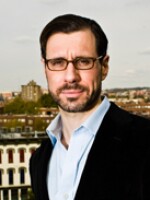ROBERT SIEGEL, host:
From NPR News, this is ALL THINGS CONSIDERED. I'm Robert Siegel.
MICHELE NORRIS, host:
And I'm Michele Norris.
Russian President Vladimir Putin has finally answered at least one of the questions about his country's political future. Today, Putin picked a loyal cabinet official as his favored successor. Putin's endorsement means Dimitry Medvedev is all but certain to become Russia's next president after the election next March. But today's announcement hasn't ended the speculation that Putin plans to hold on to power in some form after he leaves the presidency.
NPR's Gregory Feifer is in Moscow.
GREGORY FEIFER: It's been the subject of intense speculation for more than two years. Just whom Putin would like to see become president after his own term limit expires next year. Today, the leaders of four parties, including the main pro-Kremlin United Russia Party, named first Deputy Prime Minister Dimitry Medvedev as their candidate in the election. But most believe the choice was really Putin's alone. And the president said he fully endorse Medvedev's candidacy.
President VLADIMIR PUTIN (Russia): (Foreign language spoken)
FEIFER: We have the opportunity to form a stable administration in Russia, he said. It will continue following the same course that has brought us positive results during the past eight years.
Putin's sky-high approval rating and tight grip on power means Medvedev is all but assured victory in the election next March. The boyish, soft-spoken former lawyer met Putin almost 20 years ago, when both worked in the St. Petersburg city administration. Medvedev, who's 13 years younger than Putin, owes his political career to the president and is said to regard Putin as his mentor.
Putin made Medvedev chairman of the Gazprom state natural gas monopoly, and for the past two years put him in charge of Russia's so-called national projects, government initiatives to boosts social programs such as education, medicine and housing. On one of his many appearances on state-controlled television, Medvedev recently said the country's main problem is Russian's low standard of living.
Mr. DIMITRY MEDVEDEV (Russian deputy prime minister): (Foreign language spoken)
FEIFER: We've done a lot recently to boost the economy, he said, but the main task now is more difficult, including decreasing the country's still widespread poverty.
The diminutive Medvedev is seen as a weak figure. He has a far friendlier public face than most of the dour former KGB officers who occupy top positions in the Kremlin. Medvedev has charmed Western investors at international conferences, but political expert Vladimir Pribylovsky says Medvedev is far from liberal.
Mr. VLADIMIR PRIBYLOVSKY (Political expert): (Through translator) He's a pragmatist, a former businessman who's very rich. He may not be a foreign policy hawk like others in the Kremlin, but there is not much chance he'll change any of Russia's policies - at least at first.
FEIFER: Pribylovsky says Medvedev's appointment indicates Putin will almost certainly try to hold on to power after he leaves the presidency.
Mr. PRIBYLOVSKY: (Through translator) Putin wants his successor to be dependent on him and even step aside if Putin wants to come back to power. It's a question of whom Putin trust the most. And the answer is Medvedev.
FEIFER: Pribylovsky says one of Medvedev's biggest obstacles may be navigating the behind-the-scenes' battle for power between various Kremlin clans headed by former security service officers. But the main question about Russia's future is what office Putin plans to occupy after he vacates the presidency and whether he'll try to cling on to the reigns of power.
Gregory Feifer, NPR News, Moscow. Transcript provided by NPR, Copyright NPR.






